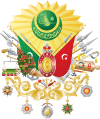Dilruba Sultan
| Dilruba Sultan | |||||
|---|---|---|---|---|---|
| Born | c. 1590 Istanbul, Ottoman Empire | ||||
| Died | c. 1623 Istanbul, Ottoman Empire | ||||
| Spouse | Damat Kara Davud Pasha | ||||
| |||||
| House | House of Osman | ||||
| Father | Mehmed III | ||||
| Mother | Halime Sultan | ||||
| Religion | Islam | ||||
Dilruba Sultan (1590 – 1623)[1] was an Ottoman princess. She was the daughter of sultan Mehmed III (r. 1595–1603) and Halime Sultan, sister of Ahmed I (r. 1603–1617) and Mustafa I (r. 1617-1618/1622-1623), and the paternal aunt of Murad IV (r. 1623–1640).
Biography[edit]
Her real name remains unknown,[1] however several modern accounts suggests that her name was Dilruba Sultan, or Dil-Ber Sultan, she was born to Sultan Mehmed III and his Abkhazian wife Halime Sultan at Manisa, 1590.
She was somewhat influential in the harems of her brothers especially during Ahmed I's final years of reign and during the reign of Mustafa I, who was a puppet controlled by his mother, and her son-in-law Kara Davud Pasha, whom was married to Dilruba Sultan.[1]
He became Kapudan Pasha for a brief time during the first reign of Mustafa I (1617-1618) and was then appointed Grand Vizier in May 20, 1622 through the influence of Mustafa's mother, his own mother-in-law. However he was dismissed in 13 June 1622 and executed in January 1623. The couple had two children, one son and one daughter. The principle reason for his execution, is the fear of Halime Sultan of the revolts that she was facing due to the execution of Osman II in a inhumane way. The Ottoman princesses were normally married away, to influential Ottoman officials, by their mothers or paternal grandmothers, who had the right to arrange their marriages and arranged matches which could be of political use. They had privileges in marriage which separated them from other Muslim females: such as the right to be the only wife of their spouse, to refuse to consummate their marriage until they were ready and to contract a divorce when they pleased. Due to many of them marrying as children and being widowed and divorced several times, often for political reasons, remarriages were very common.
It's widely believed that she was murdered by orders of Kösem Sultan, because she was Kösem's enemy and because she supported her brother Mustafa I against Kösem's son Murad IV. This is the reason that Dilruba died at a young age (33 years old).
In popular culture[edit]
In the 2016 TV series Muhteşem Yüzyıl: Kösem, she is given the name of Dilruba Sultan and is portrayed by Turkish actress Öykü Karayel.
External links[edit]
- Gendered Domains: Rethinking Public and Private in Women's History : Essays ...Dorothy O. Helly, Susan Reverby
- The Imperial Harem: Women and Sovereignty in the Ottoman Empire. Leslie P. Peirce
- Evliya Çelebi: The Intimate Life of an Ottoman Statesman, Melek Ahmed Pasha (1588-1662)
- http://www.uskudar.bel.tr/tr-tr/hizmet/rehber/sayfalar/Rehber-Detay-Icerik.aspx?GuideID=10&SubID=80&ContentID=19280
References[edit]
This article "Dilruba Sultan" is from Wikipedia. The list of its authors can be seen in its historical. Articles copied from Draft Namespace on Wikipedia could be seen on the Draft Namespace of Wikipedia and not main one.

